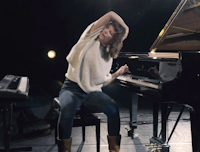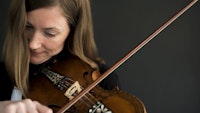Field of study: Performance Practice
Henrik Holm: The Logos in the Music

A hermeneutical investigation of Wilhelm Furtwängler's art of musical interpretation.
Summary
The German conductor Wilhelm Furtwängler (1886–1954) was one of the most famous conductors in the last century. Even today, he fascinates through recordings and brings forth monumental listening experiences. These recordings offer the listener exceptional aesthetic experiences.
Research question and aim of the study
The main research question is: How might we understand what happens when Furtwängler conducts?
Holm's aim is to develop a hermeneutical-philosophical understanding of Furtwängler’s being in the music. On which concept of reality does Furtwängler’s art of interpretation rely, and how does he convey it? What is the philosophical background of his interpretations of Beethoven and Brahms? Furtwängler provides a suitable example of how we might develop a language to describe musical interpretations.
From Holm's point of view, Furtwängler provides the listener with the possibility to take part in how the music follows its inherent expressive Logos: The aesthetic experience of Furtwängler’s art of interpretation, as we can grasp it through the recordings, has something to do with how he follows the relational meaning in the music.
In his writings, Furtwängler presents his view on musical performance and his understanding of Beethoven and Brahms. Furtwängler as a writer gives a remarkable insight into his thinking about music. In order to develop a hermeneutical approach of Furtwängler’s art of interpretation, it is necessary to take his writings into consideration. Holm sees his writings and the recordings as a unity. His thinking regulates then musical development. With such a perspective, the study intends to probe into what’s happening in Furtwängler’s art of interpretation.
Theoretical framework
In the introduction, Holm establishes a foundation of my approximation to Furtwängler’s art of interpretation as it exists as texts and recordings. He also situates the study more generally in a context of philosophy of art and musicology. In this context, Holm considers methodological questions about music and language in connection with essential patterns in the philosophy of Ludwig Wittgenstein. In chapter two, Holm looks at the historical background of Furtwängler; thereby he presents perspectives about his biography, thinking and historical situation, which he regards as crucial in order to understand his art of interpretation. Chapter three deepens Furtwängler’s concept about musical interpretation. Chapter four investigates Furtwängler’s being in the music with help from some essential thoughts in Heidegger’s philosophy. In chapter five, Holm describes how Furtwängler conveys reality conception in Beethoven’s music. The chapter starts with a discussion about Furtwängler’s understanding of Beethoven, and then presents some examples from the recordings. The study proceed by describing, with concepts from Schelling’s philosophy of art, what Holm suggests to call Furtwängler’s ideal-realistic interpretation of Beethoven. In chapter six, Holm considers Furtwängler’s Brahms- interpretation. The seventh and last chapter takes a broader perspective on the whole way of thinking in order to allow the reader to conclude.
Results
The results of the monography are its ways of thinking. Such a form of aesthetic thinking about one concrete person in the history of music is a new kind of academic and hermeneutical understanding of the art of musical interpretation. My intention is to open up for a philosophical understanding and dialogue about musical interpretation. Furtwängler is an excellent starting point for such a discussion.
The dissertation
Title (translated from Norwegian): The Logos in the Music. A hermeneutical investigation of Wilhelm Furtwängler’s art of musical interpretation.
The dissertation is a monograph, written in Norwegian.
The dissertation is available in NMH's digital archive.
Articles relevant
Published: Sep 3, 2014 — Last updated: Dec 18, 2025

